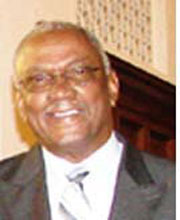
My Brother’s Keeper
God understands when you feel angry
By Rev. Joe McLin From the Milwaukee Courier-Journal
Anger, hostility, or even rage may be emotions that you feel or experience from time to time.
These intense feelings and behaviors that are the results of your anger can sometimes cause serious destruction in the lives of the person who experiences them. They also can cause problems in the lives of others, possibly those closest to you.
Many people may try to deny their anger and destructively ‘self medicate’ themselves to ease the hurt behind the anger.
Other people may sadly take out their anger on the ones they love the most. This in itself can, and usually does, negatively raise the emotions of everyone involved.
To try and understand just where the anger is coming from in our lives can be helpful in dealing with and overcoming these recurring emotions. Usually there is a deep rooted hurt beneath anger.
This hurt could come from an earlier life experience from childhood, a personal relationship that has gone badly, a traumatic event, even a death of a loved one.
Angry resentment directed toward ourselves and others can destroy us and those a-round us.
But when we acknowledge the deep rooted hurts we have experienced and begin to understand, that we alone cannot make right the wrongs that have happened to us, we can release the hurt and bitterness we feel into the hands of God which is essential to our personal healing.
(Ephesians 4:26-32, NIV); “In your anger do not sin. Do not let the sun go down while you are still angry, and do not give the devil a foothold.
He who has been stealing must steal no longer, but must work, doing something useful with his own hands, that he may have something to share with those in need.
Do not let any unwholesome talk come out of your mouths but only what is helpful for building others up according to their needs, that it may benefit those who listen.
And do not grieve the Holy Spirit of God, with whom you were sealed for the day of redemption. Get rid of all bitterness, rage and anger, brawling and slander, along with every form of malice.
Be kind and compassionate to one another, forgiving each other, just as in Christ God for-gave you.”
When we sometimes feel that life itself seems to be unfair, and no matter how much we try to follow the ‘rules’ of life, nothing seems to go our way, we get angry.
The question of ‘WHY ME’ is quick to surface; but it may not be a question, rather a statement. The statement is, “what happened to me is unfair”, “or I don’t deserve this”. I am angry about this and somebody is going to pay for this.
What we may be most angry about is that the whole world and God are different from what we want them to be.
As children we were taught that if we were good, nothing bad would ever happen to us.
We believed that if we shared things with others, if we were good to others, life would be fair to us. We later learned that life is not always fair or easily understood.
We are probably protesting that something unfair has happened to us, that we do not want to accept what has happened to us, that we are angry about what has happened to us, and that we do not intend to change our attitude until someone or God finds a way to fix it.
WELL, why don’t we “Have a Little Talk with JESUS and Tell HIM all our sorrows?”
“Dear Lord, in my life there is much I do not understand, so much that remains a mystery to me. I am sure you love me and I believe in your promise to always be present with me in every aspect of my life. When life seems unfair, help me hold fast to you.
“I recognize that there are angry resentments in my life that are holding me in bondage, and these negative emotions are destroying me and the people I love the most.
“Hear my cry of pain and gently lead me to your loving arms of warmth and peacefulness and understanding.
“I thank you for encouraging me to believe that your grace can and will help me to change.”
“ In your precious name, AMEN
